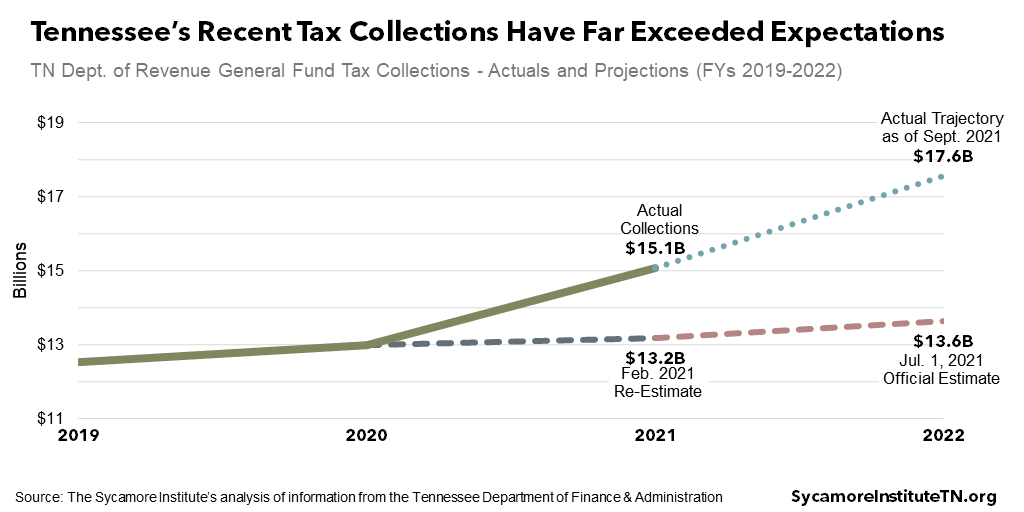The Tennessee State Funding Board – the group responsible for setting the revenue projections used in state budgeting – met this week and got it wrong. Again. Like they do every single year.
Why does this even matter? Well, the Funding Board estimates are used to determine the parameters for the state budget. When the question is asked “why don’t we budget more for X,” the answer can be: The Funding Board says we won’t have that money.
Except, well, the Funding Board is wrong. ALL THE TIME.
Let’s look at the most recent evidence. This year, Tennessee is sitting on the largest budget surplus ever. EVER. That’s because state revenue came in at $2 billion ABOVE projections.
While the Funding Board is estimating growth for the upcoming (2023) fiscal year to be 2%, the Sycamore Institute notes that revenue for the current fiscal year is coming in at 24% above projections (so far).
- Actual collections for October 2021 were about 22% higher than budgeted.
- As of October 31, 2021, Tennessee had collected about 24% of the $16.5 billion in total budgeted revenue for the current fiscal year.
- Collections through October were about $902 million higher (or 24%) than what was budgeted for the time period.
While this MIGHT be understandable given the COVID-19 pandemic, the reality is the Funding Board gets it wrong a lot – and this results in budgets that are significantly lower than revenue growth would allow. So, we now have a giant surplus while schools are significantly underfunded.
Here’s some analysis from 2020 on what these underestimates mean:
For five years actual revenue growth was more than double state estimates, leaving $3 billion in surplus while public schools remain under-funded. While state K-12 funding did increase by $700 million over those years, had the state doubled K-12 investment to $1.4 billion, a substantial surplus would still have remained while also moving Tennessee schools out of the bottom 10 in funding.
That’s right, for five consecutive years starting in 2015, state revenue growth was double or more than what the Funding Board projected. The pandemic is no excuse. This is a planned, intentional underfunding of the state budget. Frankly, taxpayers should be furious. Money is being paid in so that the state may offer services. Then, the state is simply NOT offering the services. Or, they are offering services at levels well below what they should be.
K-12 funding is a great example. A bipartisan state body suggests we need an additional $1.7 billion to adequately fund schools. The money is there – in fact, nearly double that amount of money is there. And, we’re collecting around 24% more than planned so far this fiscal year. That’s a HUGE surplus. In fact, it’s nearly $1 billion in just the first three months of the fiscal year.
Still, the Funding Board seems content to set its sights low – far underestimating the potential of Tennessee. This means our schools, our infrastructure, our health care system, public safety, and more are being shortchanged.
Lawmakers would do well to question these faulty estimates. Or, better yet, just throw them away. We have years of historical data that can give us a pretty clear picture of where our revenue will be. We’re $1 billion ahead this year already.
Looking back at 2020, here’s more evidence that the Funding Board is basically just making stuff up – possibly in hopes of starving public services to serve some unknown goal:
There is already a problem with this year’s estimates. The State Funding Board, a panel of constitutional officers and the state finance director, recently approved a growth rate of between 2.7% and 3.1%, well below even the most pessimistic predictions by economists hired by the state.
It is the lowest rate since 2014, when the board predicted little to no growth. This led then-Gov. Haslam to eliminate a promised $50 million state teacher raise. Actual revenue grew 5% in 2014-2015, leading to a $552 million surplus while teachers got nothing.
The board also had to increase its growth estimate for 2019-2020, predicting a general fund surplus of $430 – $500 million. Even this upward revision may be far too low. First-quarter general fund growth was 8.1%, more than double the revised estimate, which could generate a surplus up to $900 million.
Getting it wrong by a point or two is expected. Being off in a single year by 2 or more points is an anomaly, but it could happen. But, when actual growth is double or more your estimate year after year for five years or more, there’s a deeper philosophical problem. Or, you just don’t know what you’re doing.
It seems more likely, though, that those behind the numbers know exactly what they are doing.

For more on education politics and policy in Tennessee, follow @TNEdReport
Thankful for your support – $5 or more makes this work possible.








